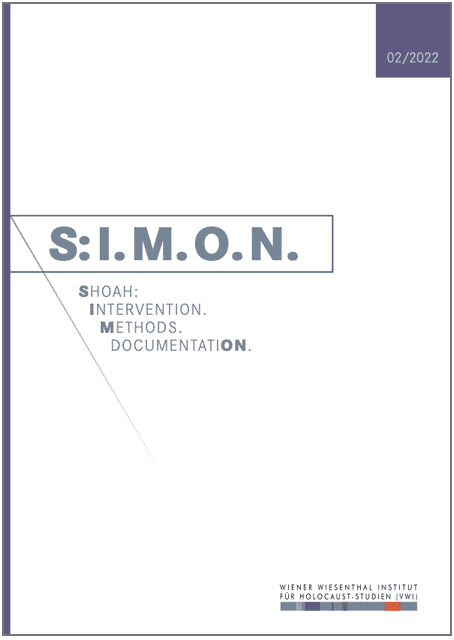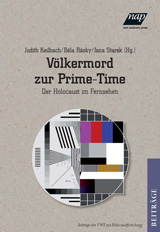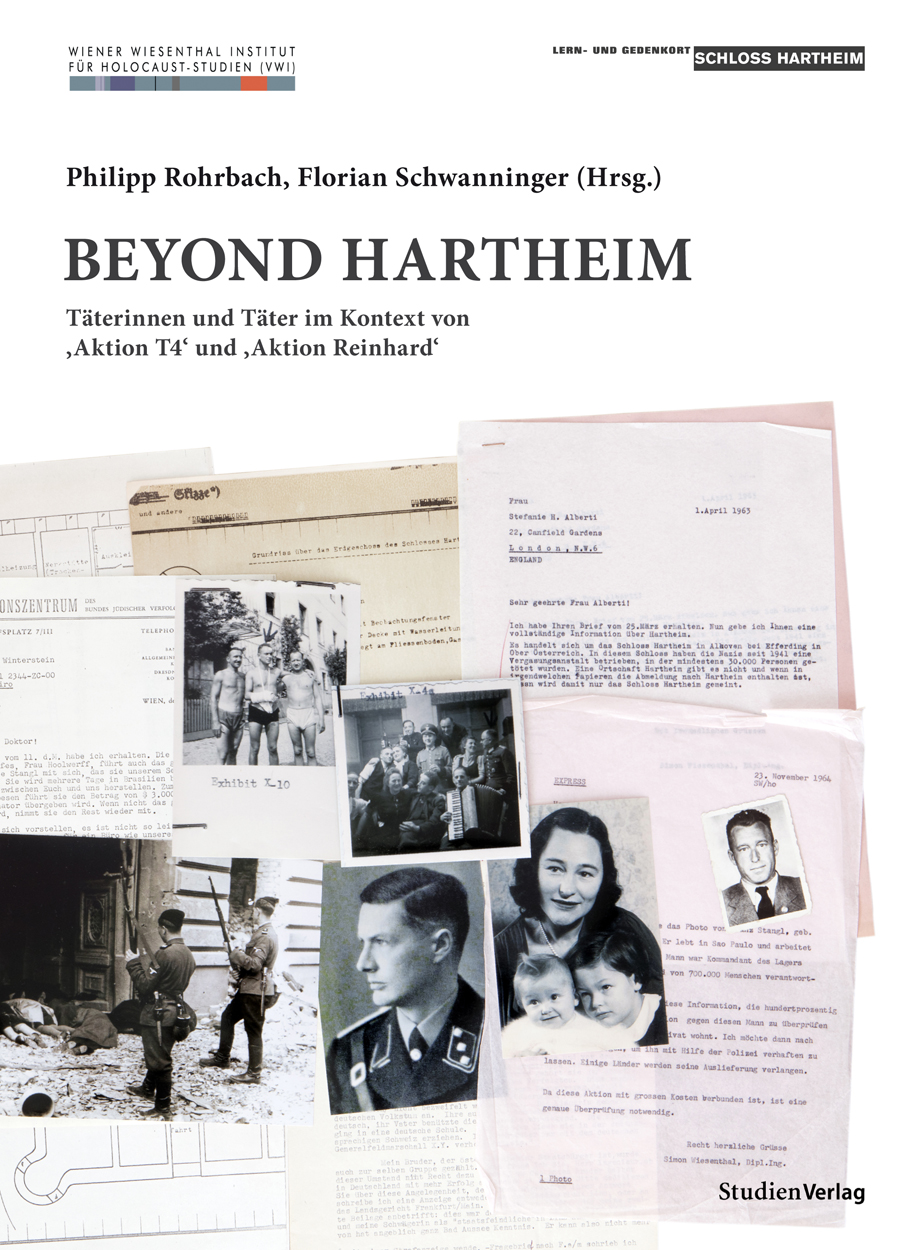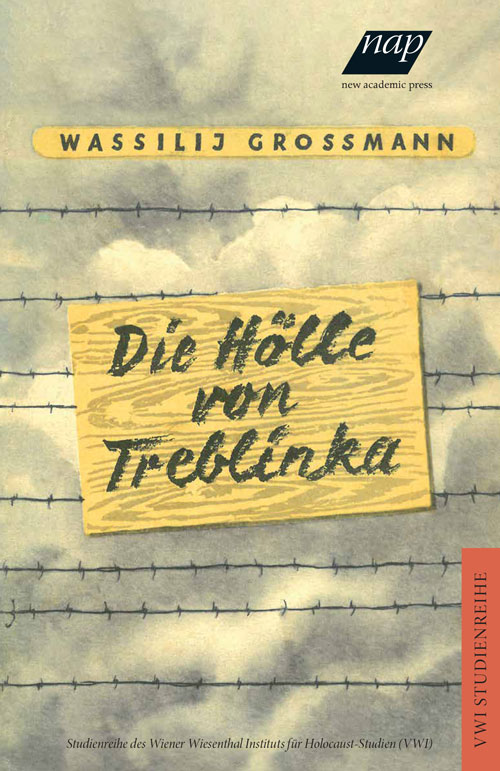News – Events – Calls
| 02. May 2024 18:30 Simon Wiesenthal LectureEdyta Gawron: Never Too Late to Remember, Never Too Late for Justice! Holocaust Research and Commemoration in Contemporary PolandIn 1994, Simon Wiesenthal received a doctorate honoris causa from the Jagiellonian University in Krakow for his lifelong quest for justice – half a century after he had been, for a short time, prisoner of the local Nazi Concentration Camp (KL) Plaszow. The 1990s were the decade when t...Weiterlesen... |
| 07. May 2024 00:00 - 04. June 2024 00:00 WorkshopDealing with Antisemitism in the Past and Present. Scientific Organisations and the State of Research in AustriaThis series of talks, presented by antisemitism experts from different organisations that research antisemitism using a variety of academic approaches, aims to provide a snapshot of historical evolutions, current events, prevalent perceptions and declared (and undeclared) attitudes. I...Weiterlesen... |
| 14. May 2024 08:45 - 16. May 2024 16:30 TagungQuantifying the Holocaust. Classifying, Counting, Modeling: What Contribution to Holocaust History? About the conference: https://quantiholocaust.sciencesconf.org/ Programme timed on the basis of 15-minute presentations + 15-minute discussions; short breaks and lunches Day 1 Tuesday, 14 May 2024Centre Malher (9 rue Malher 75004 Paris/amphi Dupuis) From 8.45 am: Welcome9.30 am...Weiterlesen... |
| 24. May 2024 18:00 InterventionLange Nacht der Forschung 20242024 öffnet das Wiener Wiesenthal Institut für Holocaust-Studien (VWI) in der Langen Nacht der Forschung wieder seine Tore und lädt Interessierte in seine Räumlichkeiten am Rabensteig 3 ein. Im Rahmen von Vorträgen, Podiumsdiskussionen und Präsentationen bieten VWI-Team und Gäste Einb...Weiterlesen... |
| 04. June 2024 13:00 VWI invites/goes to...Workshop: Social History of the Shoah. Everyday Life, Space and Time VWI invites the Department of Contemporary History, University of Vienna 13:00Hannah Riedler (VWI Junior Fellow)Between Deportation, Forced Labour and Germanisation. The Umwandererzentralstelle in Occupied Poland 1939–1941Commented by Kerstin von Lingen 13:40...Weiterlesen... |
| 13. June 2024 18:30 Simon Wiesenthal LectureJack Fairweather: The Trials of Fritz Bauer. How Life as a Gay Jewish Socialist under the Nazis Shaped His Quest for JusticeFritz Bauer’s daring mission to bring Adolf Eichmann and the perpetrators of Auschwitz to justice forced Germany and the world to pay attention to the crimes of the Holocaust. Bauer’s moral courage in speaking out in a society that had not yet come to terms with its past, which he him...Weiterlesen... |
Current fellows
VWI-Fellows
The steady stream of guest researchers (senior, research, and junior fellows) visiting the institute ensures that the VWI’s research agendas remain steadily innovative. The concept of an annual substitution of fellows guarantees that guest researchers remain in permanent exchange with their relevant scientific community and thus ensures that top early career scholars are included and supported. Young researchers and experienced scholars thus engage in a mutual exchange as they work on their questions, present their results to the public at conferences, lectures, and in publications, and use their insights to contribute to the institute’s on-going research and education projects. In this way, the fellowship programme enables the VWI to bring the best and most interesting researchers of all age groups and from various academic disciplines to the institute from Austria and abroad, allowing the scholars to form a temporary affiliation with the institute without interrupting their academic or other careers. It is the aim of the programme to ensure the diversity of the research programme by choosing fellows from a broad range of regional backgrounds, methodical approaches, and a mixture of academic disciplines.
The VWI fellows are assisted academically and administratively during their stay in Vienna by the institute. They are required to present a colloquium on their topic of research and to discuss a chosen source or method relevant to their research in a methods and sources seminar together with the other fellows, under the direction of the research director, the research staff, and the institute management. After completion of their stay at the VWI, they are required to submit a scholarly article to the institute’s e-journal S:I.M.O.N.– Shoah: Intervention. Methods. Documentation., which prior to publication is subject to a peer review process.
Since the academic year 2020/2021 the Gerda Henkel Foundation funds Research Fellowships at the VWI.
The first VWI fellowship programme took place in the academic year 2012/13, when two senior fellows, two research fellows, and four junior fellows began their stay at the institute on 1 October 2012. Currently, over fifty researches from various disciplines have completed a fellowship at the VWI and have become VWI alumnae and alumni.
A call for applications is issued for junior, research, and senior fellowships in November of each year in general following the annual meeting of VWI‘s International Academic Advisory Board; the deadline for applications is around mid-February of the following year. The Advisory Board is solely responsible for the awarding of fellowships on the basis of individual applications.
Conny Kristel EHRI-Fellowships
Fellowships in the framework of the EU project European Holocaust Research Infrastructure promote Holocaust research by enabling access to Holocaust-relevant collections as well as to know-how in the field of Digital Humanities. They are intended especially for early career scholars with limited means especially from East Central and Eastern Europe: Fellowships beyond four to six weeks in length are exceptional. The individual institutions in Europe, the USA, and Israel connected to each other through EHRI-2 received specific time contingents for for these fellowships: The VWI received altogether 19 weeks between 2016 and 2018.
With the start of EHRI-3 the program was expanded, adapted to the experiences from the previous project. In memory of EHRI's first project director, who died in October 2018, the fellowships were named after Conny Kristel.
VWI-Fortunoff-Fellowships
The Fortunoff Video Archive at the University of Yale and the Vienna Wiesenthal Institute for Holocaust Studies (VWI) run a joint fellowship program from 2018/2019.
The Fortunoff Archive is a collection of the Yale University's Sterling Memorial Library manuscript collection, with more than 4,000 testimonies from survivors of the Holocaust. Since 2017, it is already possible to view these holdings – more than 10,000 hours of video material – also via the archive of the VWI.
The Fellow will work on a subject of his/her choice at the VWI using the Fortunoff collection via online access. In addition, within the framework of this fellowship, a testimony – preferably in a ‘small’ language of the European East – is transcribed, annotated, annotated and critically edited. A brief introduction and contextualisation make the testimony easier to understand for non-academic audiences. The critical edition will be posted online on the homepage of the Fortunoff Archive as well as that of the VWI after completion of the fellowship.
The Call for Papers is posted at the same time as the one for the VWI fellowships. A subcommittee in which the International Scientific Advisory Board of the VWI, the academic staff, and the Yale University is represent by one person each, evaluate the proposals and decide about the respective invitation.
Dubnow-Wiesenthal-Fellowship
In the summer of 2017, the heads of the Simon Dubnow Institute in Leipzig and the VWI discussed the possibility of a joint fellowship combining the respective thematic research focus of each institution: ‘Jewish Studies’, antisemitism, the Holocaust, and racism. After a trial run, decisions will have to be made about further applications and future selection criteria, and funding will have to be secured exclusively from third parties.
Ernst Mach Grant Recipients
The Ernst Mach Grant Programme is named after the influential Austrian physicist and philosopher Ernst Mach (1838-1916). The grant programme is financed by the Austrian Federal Ministry of Education, Science and Research (BMBWF). Students and young researchers from foreign universities are invited to apply for this grant to undertake a research visit to Austria. The VWI adopts some of the researchers in this grant programme on a case by case basis in the framework of its fellowship programme.
Artist in Residence
This third-party funded programme enables the VWI in cooperation with creative artists to transcend the institute’s three pillars of activity – documentation, research, and dissemination – in the engagement with and commemoration of the Holocaust. Since the 1980s, the politics of memory as well as the central position of the Holocaust therein have also become the subject of cultural and artistic debates. This is the result not least of all of the recognition that scholarly presentations and texts only have a limited reach and only address a specific audience. The artist-in-residence programme is an attempt to attract a broader, not exclusively academic audience interested in engaging with antisemitism, racism, and the Holocaust, including their prehistory and aftermath – to confront them with historical and political questions through unexpected, even provocative means. Artistic interventions and actions allow for various methods to be exploited that simultaneously combine various forms of perception and enable the activation of audio-visual and tactile-visual sensations. Thereby, traditional understandings can be problematized in various contexts.
An innovative and experimental treatment of the questions of representation and memory of the Shoah, when closely connected to state-of-the-art research, can have a more enduring impact than the mere dissemination of knowledge and inspire independent engagements with related problems and questions.
The programme will be accompanied by interventions in the public sphere, colloquia, and discussions of the results.
Subcategories
EHRI-Fellow
EHRI-Fellow_En
Gerda Henkel – Research Fellow
Gerda Henkel – Research Fellow
Fellows from Ukraine
Fellows from Ukraine










